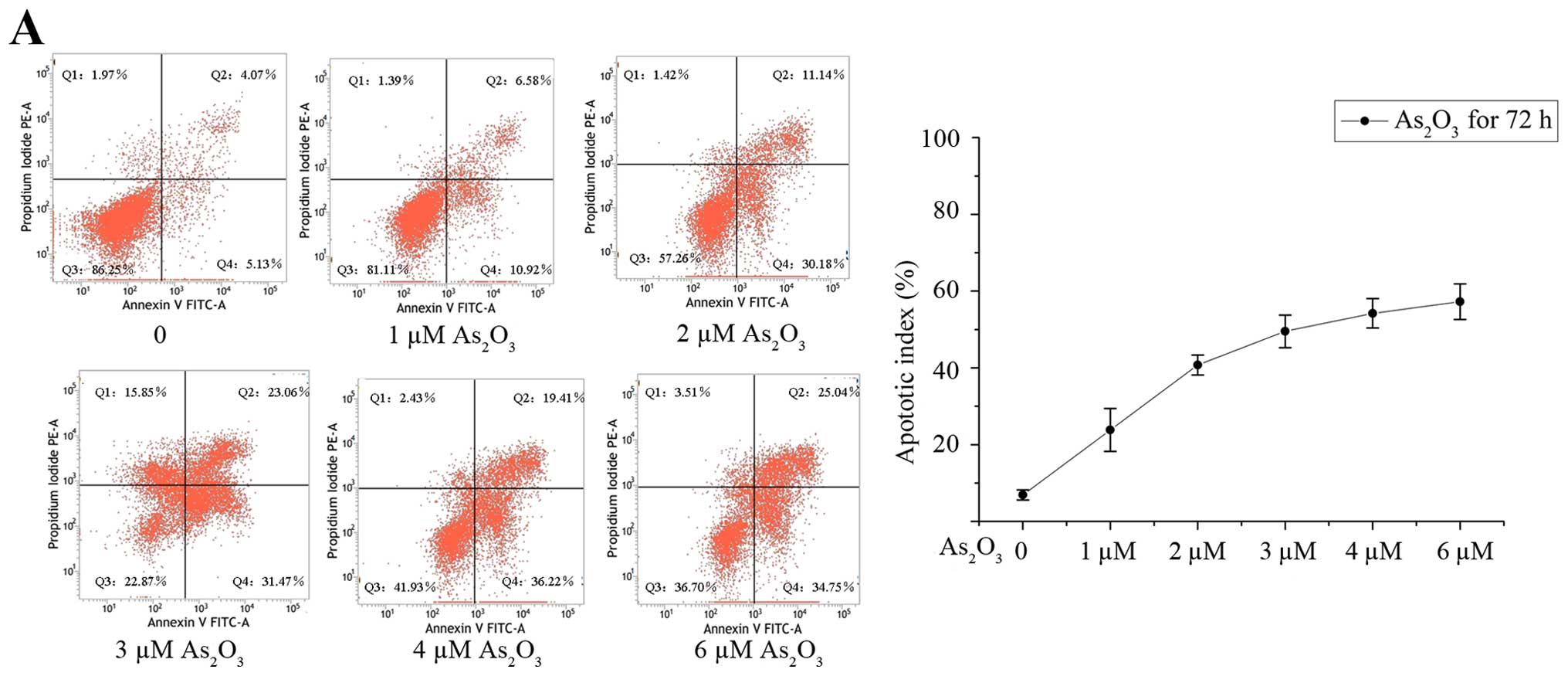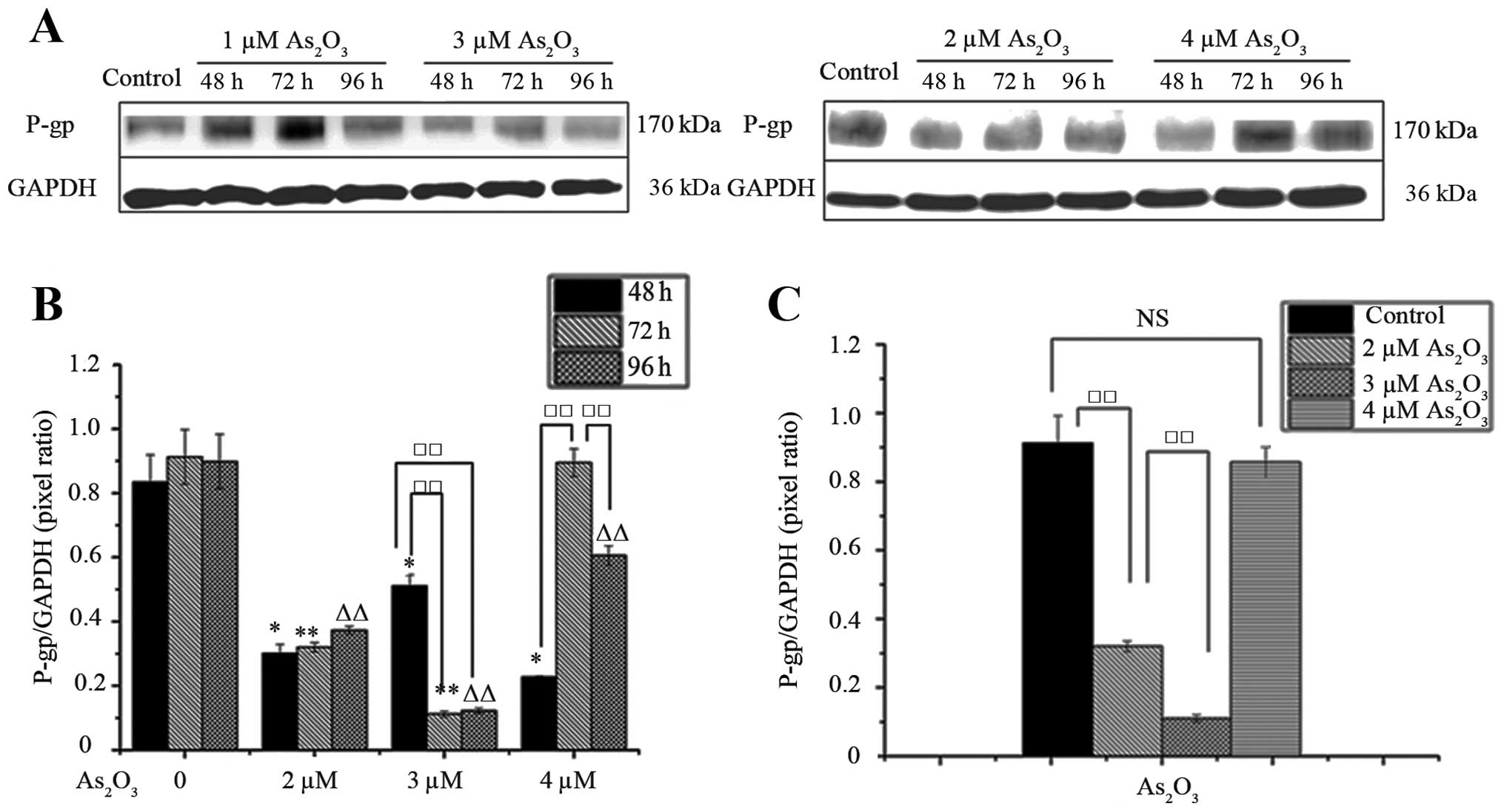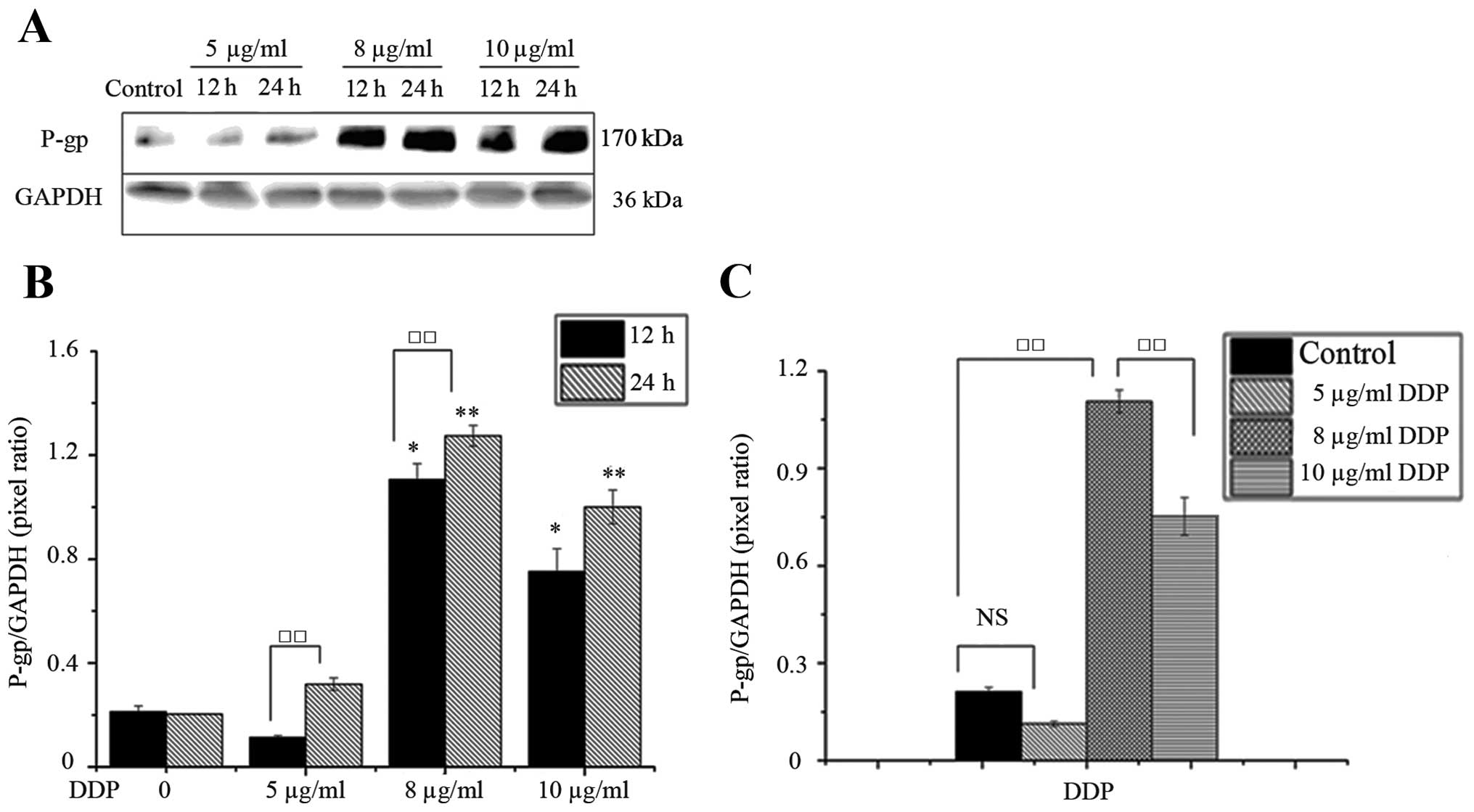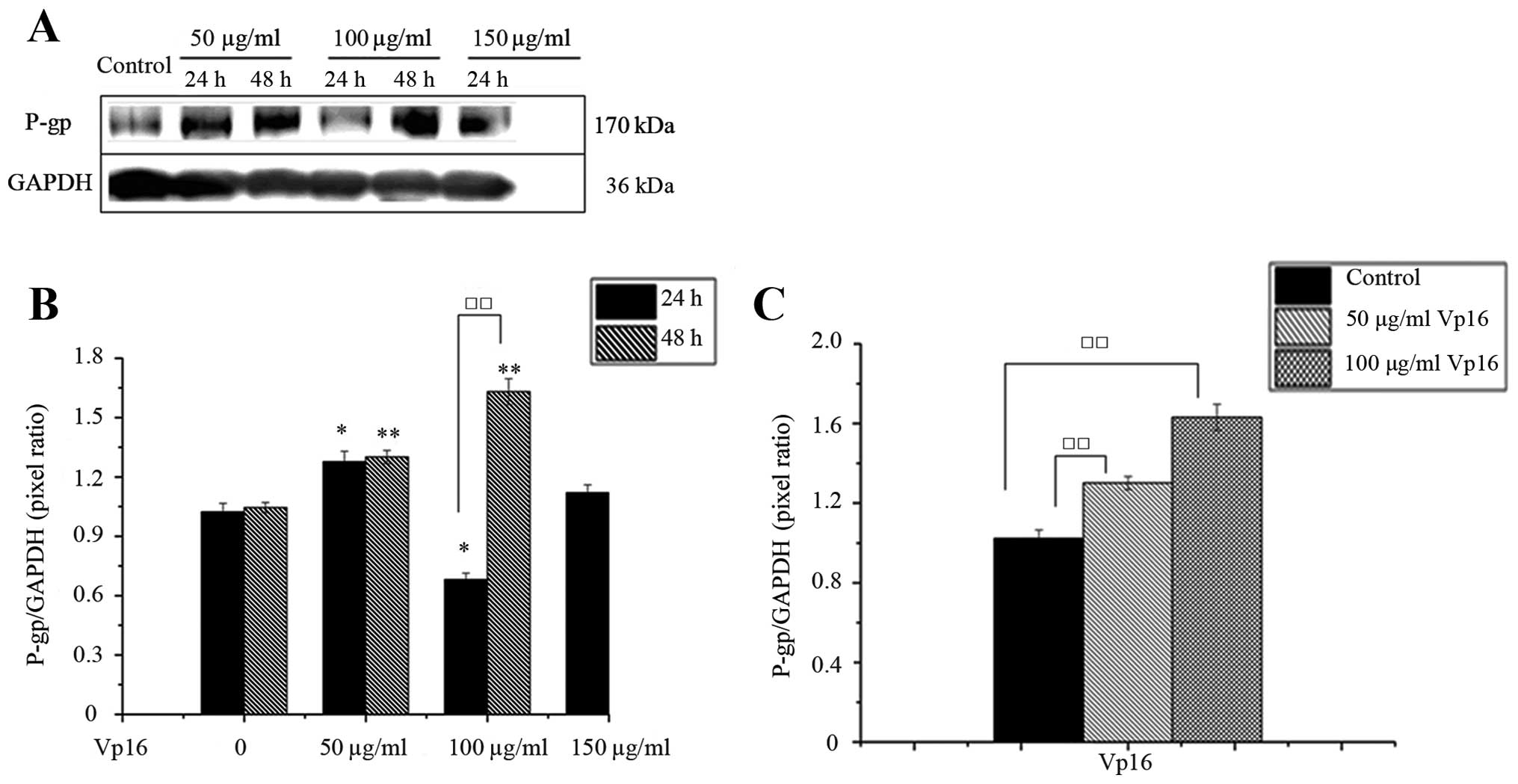|
1
|
Li T, Cui ZB, Ke XX, Tan J, Li FF, Li T,
Wang XW and Cui HJ: Essential role for p53 and caspase-9 in DNA
damaging drug-induced apoptosis in neuroblastoma IMR32 cells. DNA
Cell Biol. 30:1045–1050. 2011. View Article : Google Scholar : PubMed/NCBI
|
|
2
|
Wolter J, Angelini P and Irwin M: p53
family: Therapeutic targets in neuroblastoma. Future Oncol.
6:429–444. 2010. View Article : Google Scholar : PubMed/NCBI
|
|
3
|
Cohn SL, Pearson AD, London WB, Monclair
T, Ambros PF, Brodeur GM, Faldum A, Hero B, Iehara T, Machin D, et
al; INRG Task Force. The International Neuroblastoma Risk Group
(INRG) classification system: An INRG Task Force report. J Clin
Oncol. 27:289–297. 2009. View Article : Google Scholar :
|
|
4
|
Sato Y, Kurosawa H, Sakamoto S, Kuwashima
S, Hashimoto T, Okamoto K, Tsuchioka T, Fukushima K and Arisaka O:
Usefulness of 18F-fluorodeoxyglucose positron emission
tomography for follow-up of 13-cis-retinoic acid treatment for
residual neuroblastoma after myeloablative chemotherapy. Medicine
(Baltimore). 94:e12902015. View Article : Google Scholar
|
|
5
|
Yu AL, Gilman AL, Ozkaynak MF, London WB,
Kreissman SG, Chen HX, Smith M, Anderson B, Villablanca JG, Matthay
KK, et al; Children’s Oncology Group. Anti-GD2 antibody with
GM-CSF, interleukin-2, and isotretinoin for neuroblastoma. N Engl J
Med. 363:1324–1334. 2010. View Article : Google Scholar : PubMed/NCBI
|
|
6
|
Lim JY, Kim YS, Kim KM, Min SJ and Kim Y:
B-carotene inhibits neuroblastoma tumorigenesis by regulating cell
differentiation and cancer cell stemness. Biochem Biophys Res
Commun. 450:1475–1480. 2014. View Article : Google Scholar : PubMed/NCBI
|
|
7
|
Pettersson HM, Karlsson J, Pietras A, Øra
I and Påhlman S: Arsenic trioxide and neuroblastoma cytotoxicity. J
Bioenerg Biomembr. 39:35–41. 2007. View Article : Google Scholar : PubMed/NCBI
|
|
8
|
Keshelava N, Davicioni E, Wan Z, Ji L,
Sposto R, Triche TJ and Reynolds CP: Histone deacetylase 1 gene
expression and sensitization of multidrug-resistant neuroblastoma
cell lines to cytotoxic agents by depsipeptide. J Natl Cancer Inst.
99:1107–1119. 2007. View Article : Google Scholar : PubMed/NCBI
|
|
9
|
Yonehara A, Tanaka Y, Kulkeaw K, Era T,
Nakanishi Y and Sugiyama D: Aloe vera extract suppresses
proliferation of neuroblastoma cells in vitro. Anticancer Res.
35:4479–4485. 2015.PubMed/NCBI
|
|
10
|
Goldsmith KC and Hogarty MD: Targeting
programmed cell death pathways with experimental therapeutics:
Opportunities in high-risk neuroblastoma. Cancer Lett. 228:133–141.
2005. View Article : Google Scholar : PubMed/NCBI
|
|
11
|
Street CA, Routhier AA, Spencer C, Perkins
AL, Masterjohn K, Hackathorn A, Montalvo J, Dennstedt EA and Bryan
BA: Pharmacological inhibition of Rho-kinase (ROCK) signaling
enhances cisplatin resistance in neuroblastoma cells. Int J Oncol.
37:1297–1305. 2010.PubMed/NCBI
|
|
12
|
Qiu YY, Mirkin BL and Dwivedi RS:
Inhibition of DNA methyltransferase reverses cisplatin induced drug
resistance in murine neuroblastoma cells. Cancer Detect Prev.
29:456–463. 2005. View Article : Google Scholar : PubMed/NCBI
|
|
13
|
Pajic M, Norris MD, Cohn SL and Haber M:
The role of the multidrug resistance-associated protein 1 gene in
neuroblastoma biology and clinical outcome. Cancer Lett.
228:241–246. 2005. View Article : Google Scholar : PubMed/NCBI
|
|
14
|
Huang JM, Sheard MA, Ji L, Sposto R and
Keshelava N: Combination of vorinostat and flavopiridol is
selectively cytotoxic to multidrug-resistant neuroblastoma cell
lines with mutant TP53. Mol Cancer Ther. 9:3289–3301. 2010.
View Article : Google Scholar : PubMed/NCBI
|
|
15
|
Iwasaki I, Sugiyama H, Kanazawa S and
Hemmi H: Establishment of cisplatin-resistant variants of human
neuroblastoma cell lines, TGW and GOTO, and their drug
cross-resistance profiles. Cancer Chemother Pharmacol. 49:438–444.
2002. View Article : Google Scholar : PubMed/NCBI
|
|
16
|
Gillet JP, Efferth T and Remacle J:
Chemotherapy-induced resistance by ATP-binding cassette transporter
genes. Biochim Biophys Acta. 1775:237–262. 2007.PubMed/NCBI
|
|
17
|
Gesundheit B, Malach L, Or R and Hahn T:
Neuroblastoma cell death is induced by inorganic arsenic trioxide
(As (2)O (3)) and inhibited by a normal human bone marrow
cell-derived factor. Cancer Microenviron. 1:153–157. 2008.
View Article : Google Scholar
|
|
18
|
Au WY, Li CK, Lee V, Yuen HL, Yau J, Chan
GC, Ha SY and Kwong YL: Oral arsenic trioxide for relapsed acute
promyelocytic leukemia in pediatric patients. Pediatr Blood Cancer.
58:630–632. 2012. View Article : Google Scholar
|
|
19
|
Iland HJ, Bradstock K, Supple SG, Catalano
A, Collins M, Hertzberg M, Browett P, Grigg A, Firkin F, Hugman A,
et al; Australasian Leukaemia and Lymphoma Group. All-transretinoic
acid, idarubicin, and IV arsenic trioxide as initial therapy in
acute promyelocytic leukemia (APML4). Blood. 120:1570–1580; quiz
1752. 2012. View Article : Google Scholar
|
|
20
|
Haga N, Fujita N and Tsuruo T: Involvement
of mitochondrial aggregation in arsenic trioxide
(As2O3)-induced apoptosis in human
glioblastoma cells. Cancer Sci. 96:825–833. 2005. View Article : Google Scholar : PubMed/NCBI
|
|
21
|
Pettersson HM, Pietras A, Munksgaard
Persson M, Karlsson J, Johansson L, Shoshan MC and Påhlman S:
Arsenic trioxide is highly cytotoxic to small cell lung carcinoma
cells. Mol Cancer Ther. 8:160–170. 2009. View Article : Google Scholar : PubMed/NCBI
|
|
22
|
Lallemand-Breitenbach V, Zhu J, Chen Z and
de Thé H: Curing APL through PML/RARA degradation by
As2O3. Trends Mol Med. 18:36–42. 2012.
View Article : Google Scholar
|
|
23
|
Woo SY, Lee MY, Jung YJ, Yoo ES, Seoh JY,
Shin HY, Ahn HS and Ryu KH: Arsenic trioxide inhibits cell growth
in SH-SY5Y and SK-N-AS neuroblastoma cell lines by a different
mechanism. Pediatr Hematol Oncol. 23:231–243. 2006. View Article : Google Scholar : PubMed/NCBI
|
|
24
|
Kim DW, Ahan SH and Kim TY: Enhancement of
arsenic trioxide (As(2)O(3))-mediated apoptosis using berberine in
human neuroblastoma SH-SY5Y Cells. J Korean Neurosurg Soc.
42:392–399. 2007. View Article : Google Scholar
|
|
25
|
Florea AM, Splettstoesser F and Büsselberg
D: Arsenic trioxide (As2O3) induced calcium
signals and cytotoxicity in two human cell lines: SY-5Y
neuroblastoma and 293 embryonic kidney (HEK). Toxicol Appl
Pharmacol. 220:292–301. 2007. View Article : Google Scholar : PubMed/NCBI
|
|
26
|
Karlsson J, Edsjö A, Påhlman S and
Pettersson HM: Multidrug-resistant neuroblastoma cells are
responsive to arsenic trioxide at both normoxia and hypoxia. Mol
Cancer Ther. 4:1128–1135. 2005. View Article : Google Scholar : PubMed/NCBI
|
|
27
|
Ryu KH, Woo SY, Lee MY, Jung YJ, Yoo ES,
Seoh JY, Kie JH, Shin HY and Ahn HS: Morphological and biochemical
changes induced by arsenic trioxide in neuroblastoma cell lines.
Pediatr Hematol Oncol. 22:609–621. 2005. View Article : Google Scholar : PubMed/NCBI
|
|
28
|
Karlsson J, Øra I, Pörn-Ares I and Påhlman
S: Arsenic trioxide-induced death of neuroblastoma cells involves
activation of Bax and does not require p53. Clin Cancer Res.
10:3179–3188. 2004. View Article : Google Scholar : PubMed/NCBI
|
|
29
|
Qian XP, Liu BR, Yin HT, Wang LF, Zou ZY
and Du J: Effect of arsenic trioxide on drug transporting molecules
in acute promyelocytic leukemia cell line. Zhonghua Zhong Liu Za
Zhi. 26:601–605. 2004.(In Chinese).
|
|
30
|
Lang WH and Sandoval JA: Detection of PI3K
inhibition in human neuroblastoma using multiplex luminex bead
immunoassay: A targeted approach for pathway analysis. J Biomol
Screen. 19:1235–1245. 2014. View Article : Google Scholar : PubMed/NCBI
|
|
31
|
Zhao D, Jiang Y, Dong X, Liu Z, Qu B,
Zhang Y, Ma N and Han Q: Arsenic trioxide reduces drug resistance
to adriamycin in leukemic K562/A02 cells via multiple mechanisms.
Biomed Pharmacother. 65:354–358. 2011. View Article : Google Scholar : PubMed/NCBI
|
|
32
|
Zhao H, Guo W, Peng C, Ji T and Lu X:
Arsenic trioxide inhibits the growth of adriamycin resistant
osteosarcoma cells through inducing apoptosis. Mol Biol Rep.
37:2509–2515. 2010. View Article : Google Scholar
|
|
33
|
Abeltino M, Bonomini S, Bolzoni M, Storti
P, Colla S, Todoerti K, Agnelli L, Neri A, Rizzoli V and Giuliani
N: The proapoptotic effect of zoledronic acid is independent of
either the bone microenvironment or the intrinsic resistance to
bortezomib of myeloma cells and is enhanced by the combination with
arsenic trioxide. Exp Hematol. 39:55–65. 2011. View Article : Google Scholar
|
|
34
|
Xue YW, Han JG, Li BX and Yang BF:
Reversal effect and mechanism of arsenic trioxide on multidrug
resistance of gastric carcinoma cells SGC7901. Yao Xue Xue Bao.
42:949–953. 2007.(In Chinese). PubMed/NCBI
|
|
35
|
Chan JY, Siu KP and Fung KP: Effect of
arsenic trioxide on multidrug resistant hepatocellular carcinoma
cells. Cancer Lett. 236:250–258. 2006. View Article : Google Scholar
|
|
36
|
Ling YH, Jiang JD, Holland JF and
Perez-Soler R: Arsenic trioxide produces polymerization of
microtubules and mitotic arrest before apoptosis in human tumor
cell lines. Mol Pharmacol. 62:529–538. 2002. View Article : Google Scholar : PubMed/NCBI
|
|
37
|
Paffhausen T, Schwab M and Westermann F:
Targeted MYCN expression affects cytotoxic potential of
chemotherapeutic drugs in neuroblastoma cells. Cancer Lett.
250:17–24. 2007. View Article : Google Scholar
|
|
38
|
Yin H, Tang SQ and Zhao QY: Effect of
arsenic trioxide on MYCN mRNA expression in neuroblastoma cells.
Shandong Med J. 37:57–58. 2008.
|
|
39
|
D’Aguanno S, D’Alessandro A, Pieroni L,
Roveri A, Zaccarin M, Marzano V, De Canio M, Bernardini S, Federici
G and Urbani A: New insights into neuroblastoma cisplatin
resistance: A comparative proteomic and meta-mining investigation.
J Proteome Res. 10:416–428. 2011. View Article : Google Scholar
|
|
40
|
Shen ZX, Chen GQ, Ni JH, Li XS, Xiong SM,
Qiu QY, Zhu J, Tang W, Sun GL, Yang KQ, et al: Use of arsenic
trioxide (As2O3) in the treatment of acute
promyelocytic leukemia (APL): II. Clinical efficacy and
pharmacokinetics in relapsed patients. Blood. 89:3354–3360.
1997.PubMed/NCBI
|
|
41
|
Park JW, Choi YJ, Jang MA, Baek SH, Lim
JH, Passaniti T and Kwon TK: Arsenic trioxide induces G2/M growth
arrest and apoptosis after caspase-3 activation and bcl-2
phosphorylation in promonocytic U937 cells. Biochem Biophys Res
Commun. 286:726–734. 2001. View Article : Google Scholar : PubMed/NCBI
|
|
42
|
Gao F, Yi J, Yuan JQ, Shi GY and Tang XM:
The cell cycle related apoptotic susceptibility to arsenic trioxide
is associated with the level of reactive oxygen species. Cell Res.
14:81–85. 2004. View Article : Google Scholar : PubMed/NCBI
|
|
43
|
Hassani S, Ghaffari SH, Zaker F, Mirzaee
R, Mardani H, Bashash D, Zekri A, Yousefi M, Zaghal A, Alimoghaddam
K, et al: Azidothymidine hinders arsenic trioxide-induced apoptosis
in acute promyelocytic leukemia cells by induction of p21 and
attenuation of G2/M arrest. Ann Hematol. 92:1207–1220. 2013.
View Article : Google Scholar : PubMed/NCBI
|
|
44
|
Han YH, Kim SZ, Kim SH and Park WH:
Arsenic trioxide inhibits the growth of Calu-6 cells via inducing a
G2 arrest of the cell cycle and apoptosis accompanied with the
depletion of GSH. Cancer Lett. 270:40–55. 2008. View Article : Google Scholar : PubMed/NCBI
|
|
45
|
Kandasamy K and Srivastava RK: Role of the
phosphatidylinositol 3′-kinase/PTEN/Akt kinase pathway in tumor
necrosis factor-related apoptosis-inducing ligand-induced apoptosis
in non-small cell lung cancer cells. Cancer Res. 62:4929–4937.
2002.PubMed/NCBI
|
|
46
|
Chen X, Thakkar H, Tyan F, Gim S, Robinson
H, Lee C, Pandey SK, Nwokorie C, Onwudiwe N and Srivastava RK:
Constitutively active Akt is an important regulator of TRAIL
sensitivity in prostate cancer. Oncogene. 20:6073–6083. 2001.
View Article : Google Scholar : PubMed/NCBI
|
|
47
|
Chalhoub N and Baker SJ: PTEN and the
PI3-kinase pathway in cancer. Annu Rev Pathol. 4:127–150. 2009.
View Article : Google Scholar :
|
|
48
|
Zhang X, Jia S, Yang S and Yang Y, Yang T
and Yang Y: Arsenic trioxide induces G2/M arrest in hepatocellular
carcinoma cells by increasing the tumor suppressor PTEN expression.
J Cell Biochem. 113:3528–3535. 2012. View Article : Google Scholar : PubMed/NCBI
|
|
49
|
Li Y, Qu X, Qu J, Zhang Y, Liu J, Teng Y,
Hu X, Hou K and Liu Y: Arsenic trioxide induces apoptosis and G2/M
phase arrest by inducing Cbl to inhibit PI3K/Akt signaling and
thereby regulate p53 activation. Cancer Lett. 284:208–215. 2009.
View Article : Google Scholar : PubMed/NCBI
|
|
50
|
Li YM and Broome JD: Arsenic targets
tubulins to induce apoptosis in myeloid leukemia cells. Cancer Res.
59:776–780. 1999.PubMed/NCBI
|
|
51
|
Liu Q, Hilsenbeck S and Gazitt Y: Arsenic
trioxide-induced apoptosis in myeloma cells: p53-dependent G1 or
G2/M cell cycle arrest, activation of caspase-8 or caspase-9, and
synergy with APO2/TRAIL. Blood. 101:4078–4087. 2003. View Article : Google Scholar : PubMed/NCBI
|
|
52
|
Wei N, Sun H, Wang F and Liu G: H1, a
novel derivative of tetrandrine reverse P-glycoprotein-mediated
multidrug resistance by inhibiting transport function and
expression of P-glycoprotein. Cancer Chemother Pharmacol.
67:1017–1025. 2011. View Article : Google Scholar
|
|
53
|
Gibalová L, Sereš M, Rusnák A, Ditte P,
Labudová M, Uhrík B, Pastorek J, Sedlák J, Breier A and Sulová Z:
P-glycoprotein depresses cisplatin sensitivity in L1210 cells by
inhibiting cisplatin-induced caspase-3 activation. Toxicol In
Vitro. 26:435–444. 2012. View Article : Google Scholar : PubMed/NCBI
|
|
54
|
Pommier Y, Leteurtre F, Fesen MR, Fujimori
A, Bertrand R, Solary E, Kohlhagen G and Kohn KW: Cellular
determinants of sensitivity and resistance to DNA topoisomerase
inhibitors. Cancer Invest. 12:530–542. 1994. View Article : Google Scholar : PubMed/NCBI
|
|
55
|
Burg D, Riepsaame J, Pont C, Mulder G and
van de Water B: Peptide-bond modified glutathione conjugate analogs
modulate GSTpi function in GSH-conjugation, drug sensitivity and
JNK signaling. Biochem Pharmacol. 71:268–277. 2006. View Article : Google Scholar
|
|
56
|
Lee WK, Torchalski B, Kohistani N and
Thévenod F: ABCB1 protects kidney proximal tubule cells against
cadmium-induced apoptosis: Roles of cadmium and ceramide transport.
Toxicol Sci. 121:343–356. 2011. View Article : Google Scholar : PubMed/NCBI
|
|
57
|
Zhang X, Wu X, Li J, Sun Y, Gao P, Zhang
C, Zhang H and Zhou G: MDR1 (multidrug resistence 1) can regulate
GCS (glucosylceramide synthase) in breast cancer cells. J Surg
Oncol. 104:466–471. 2011. View Article : Google Scholar : PubMed/NCBI
|
|
58
|
Duraj J, Zazrivcova K, Bodo J, Sulikova M
and Sedlak J: Flavonoid quercetin, but not apigenin or luteolin,
induced apoptosis in human myeloid leukemia cells and their
resistant variants. Neoplasma. 52:273–279. 2005.PubMed/NCBI
|
|
59
|
Kuo MT, Liu Z, Wei Y, Lin-Lee YC, Tatebe
S, Mills GB and Unate H: Induction of human MDR1 gene expression by
2-acetylaminofluorene is mediated by effectors of the
phosphoinositide 3-kinase pathway that activate NF-kappaB
signaling. Oncogene. 21:1945–1954. 2002. View Article : Google Scholar : PubMed/NCBI
|
|
60
|
Zhou J, Liu M, Aneja R, Chandra R, Lage H
and Joshi HC: Reversal of P-glycoprotein-mediated multidrug
resistance in cancer cells by the c-Jun NH2-terminal kinase. Cancer
Res. 66:445–452. 2006. View Article : Google Scholar : PubMed/NCBI
|
|
61
|
Gu J, Tang Y, Liu Y, Guo H, Wang Y, Cai L,
Li Y and Wang B: Murine double minute 2 siRNA and wild-type p53
gene therapy enhances sensitivity of the SKOV3/DDP ovarian cancer
cell line to cisplatin chemotherapy in vitro and in vivo. Cancer
Lett. 343:200–209. 2014. View Article : Google Scholar
|
|
62
|
Yang X and Pagé M: P-glycoprotein
expression in ovarian cancer cell line following treatment with
cisplatin. Oncol Res. 7:619–624. 1995.PubMed/NCBI
|



















